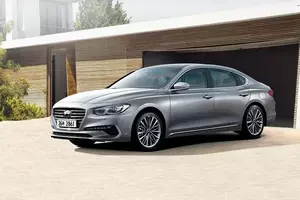
| Vehicle | Curb weight | Difference from world's smallest | Weight to power ratio | 0—60 mph acceleration ratio | Consumption ratio |
|---|---|---|---|---|---|
| 3.0 GDi V6 |
1630 kg / 3594 lbs |
1205 kg (2657 lbs) heavier | 6 kg to 1 hp | - |
165 kg/L (364 lbs/L) |
| 3.3 GDi V6 |
1671 kg / 3685 lbs |
1246 kg (2748 lbs) heavier | 6 kg to 1 hp | - |
164 kg/L (362 lbs/L) |
| 2.4 GDi |
1550 kg / 3418 lbs |
1125 kg (2481 lbs) heavier | 8 kg to 1 hp | - |
174 kg/L (384 lbs/L) |
| 2.2 CRDi |
1675 kg / 3693 lbs |
1250 kg (2756 lbs) heavier | 8 kg to 1 hp | - |
246 kg/L (542 lbs/L) |
| Vehicle | 3.0 GDi V6 |
|---|---|
| Curb weight |
1630 kg / 3594 lbs |
| Difference from world's smallest | 1205 kg (1205 lbs) heavier |
| Weight to power ratio | 6 kg to 1 hp |
| 0—60 mph acceleration ratio | - |
| Consumption ratio |
165 kg/L (364 lbs/L) |
| Vehicle | 3.3 GDi V6 |
| Curb weight |
1671 kg / 3685 lbs |
| Difference from world's smallest | 1246 kg (1246 lbs) heavier |
| Weight to power ratio | 6 kg to 1 hp |
| 0—60 mph acceleration ratio | - |
| Consumption ratio |
164 kg/L (362 lbs/L) |
| Vehicle | 2.4 GDi |
| Curb weight |
1550 kg / 3418 lbs |
| Difference from world's smallest | 1125 kg (1125 lbs) heavier |
| Weight to power ratio | 8 kg to 1 hp |
| 0—60 mph acceleration ratio | - |
| Consumption ratio |
174 kg/L (384 lbs/L) |
| Vehicle | 2.2 CRDi |
| Curb weight |
1675 kg / 3693 lbs |
| Difference from world's smallest | 1250 kg (1250 lbs) heavier |
| Weight to power ratio | 8 kg to 1 hp |
| 0—60 mph acceleration ratio | - |
| Consumption ratio |
246 kg/L (542 lbs/L) |

| Vehicle | Curb weight | Difference from world's smallest | Weight to power ratio | 0—60 mph acceleration ratio | Consumption ratio |
|---|---|---|---|---|---|
| 3.0 GDi V6 |
1580 kg / 3484 lbs |
1155 kg (2547 lbs) heavier | 6 kg to 1 hp | - | - |
| 2.4 GDi |
1525 kg / 3363 lbs |
1100 kg (2426 lbs) heavier | 8 kg to 1 hp | - | - |
| 3.0 V6 |
1662 kg / 3665 lbs |
1237 kg (2728 lbs) heavier | 7 kg to 1 hp | 208 kg/s (459 lbs/s) |
173 kg/L (381 lbs/L) |
| 3.3 V6 |
1635 kg / 3605 lbs |
1210 kg (2668 lbs) heavier | 6 kg to 1 hp | 204 kg/s (450 lbs/s) |
164 kg/L (362 lbs/L) |
| 2.4 |
1680 kg / 3704 lbs |
1255 kg (2767 lbs) heavier | 11 kg to 1 hp | - |
269 kg/L (593 lbs/L) |
| Vehicle | 3.0 GDi V6 |
|---|---|
| Curb weight |
1580 kg / 3484 lbs |
| Difference from world's smallest | 1155 kg (1155 lbs) heavier |
| Weight to power ratio | 6 kg to 1 hp |
| 0—60 mph acceleration ratio | - |
| Consumption ratio | - |
| Vehicle | 2.4 GDi |
| Curb weight |
1525 kg / 3363 lbs |
| Difference from world's smallest | 1100 kg (1100 lbs) heavier |
| Weight to power ratio | 8 kg to 1 hp |
| 0—60 mph acceleration ratio | - |
| Consumption ratio | - |
| Vehicle | 3.0 V6 |
| Curb weight |
1662 kg / 3665 lbs |
| Difference from world's smallest | 1237 kg (1237 lbs) heavier |
| Weight to power ratio | 7 kg to 1 hp |
| 0—60 mph acceleration ratio | 208 kg/s (459 lbs/s) |
| Consumption ratio |
173 kg/L (381 lbs/L) |
| Vehicle | 3.3 V6 |
| Curb weight |
1635 kg / 3605 lbs |
| Difference from world's smallest | 1210 kg (1210 lbs) heavier |
| Weight to power ratio | 6 kg to 1 hp |
| 0—60 mph acceleration ratio | 204 kg/s (450 lbs/s) |
| Consumption ratio |
164 kg/L (362 lbs/L) |
| Vehicle | 2.4 |
| Curb weight |
1680 kg / 3704 lbs |
| Difference from world's smallest | 1255 kg (1255 lbs) heavier |
| Weight to power ratio | 11 kg to 1 hp |
| 0—60 mph acceleration ratio | - |
| Consumption ratio |
269 kg/L (593 lbs/L) |
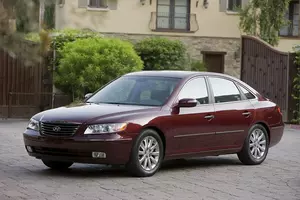
| Vehicle | Curb weight | Difference from world's smallest | Weight to power ratio | 0—60 mph acceleration ratio | Consumption ratio |
|---|---|---|---|---|---|
| 2.7 V6 |
1577 kg / 3477 lbs |
1152 kg (2540 lbs) heavier | 8 kg to 1 hp | 181 kg/s (399 lbs/s) | - |
| 3.3 V6 |
1680 kg / 3704 lbs |
1255 kg (2767 lbs) heavier | 6 kg to 1 hp | 247 kg/s (545 lbs/s) |
117 kg/L (258 lbs/L) |
| 2.4 |
1565 kg / 3451 lbs |
1140 kg (2514 lbs) heavier | 9 kg to 1 hp | - | - |
| 3.8 V6 |
1730 kg / 3815 lbs |
1305 kg (2878 lbs) heavier | 7 kg to 1 hp | 254 kg/s (560 lbs/s) | - |
| Vehicle | 2.7 V6 |
|---|---|
| Curb weight |
1577 kg / 3477 lbs |
| Difference from world's smallest | 1152 kg (1152 lbs) heavier |
| Weight to power ratio | 8 kg to 1 hp |
| 0—60 mph acceleration ratio | 181 kg/s (399 lbs/s) |
| Consumption ratio | - |
| Vehicle | 3.3 V6 |
| Curb weight |
1680 kg / 3704 lbs |
| Difference from world's smallest | 1255 kg (1255 lbs) heavier |
| Weight to power ratio | 6 kg to 1 hp |
| 0—60 mph acceleration ratio | 247 kg/s (545 lbs/s) |
| Consumption ratio |
117 kg/L (258 lbs/L) |
| Vehicle | 2.4 |
| Curb weight |
1565 kg / 3451 lbs |
| Difference from world's smallest | 1140 kg (1140 lbs) heavier |
| Weight to power ratio | 9 kg to 1 hp |
| 0—60 mph acceleration ratio | - |
| Consumption ratio | - |
| Vehicle | 3.8 V6 |
| Curb weight |
1730 kg / 3815 lbs |
| Difference from world's smallest | 1305 kg (1305 lbs) heavier |
| Weight to power ratio | 7 kg to 1 hp |
| 0—60 mph acceleration ratio | 254 kg/s (560 lbs/s) |
| Consumption ratio | - |
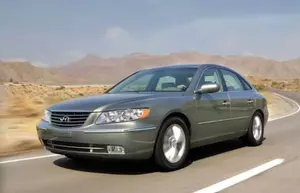
| Vehicle | Curb weight | Difference from world's smallest | Weight to power ratio | 0—60 mph acceleration ratio | Consumption ratio |
|---|---|---|---|---|---|
| 2.4 |
1565 kg / 3451 lbs |
1140 kg (2514 lbs) heavier | 10 kg to 1 hp | - | - |
| 3.8 V6 |
1730 kg / 3815 lbs |
1305 kg (2878 lbs) heavier | 7 kg to 1 hp | 254 kg/s (560 lbs/s) | - |
| 2.7 V6 |
1603 kg / 3535 lbs |
1178 kg (2598 lbs) heavier | 8 kg to 1 hp | 184 kg/s (406 lbs/s) |
162 kg/L (357 lbs/L) |
| 2.2 CRDi |
1717 kg / 3786 lbs |
1292 kg (2849 lbs) heavier | 11 kg to 1 hp | 159 kg/s (351 lbs/s) |
217 kg/L (478 lbs/L) |
| 3.3 V6 |
1664 kg / 3669 lbs |
1239 kg (2732 lbs) heavier | 7 kg to 1 hp | 225 kg/s (496 lbs/s) |
163 kg/L (359 lbs/L) |
| Vehicle | 2.4 |
|---|---|
| Curb weight |
1565 kg / 3451 lbs |
| Difference from world's smallest | 1140 kg (1140 lbs) heavier |
| Weight to power ratio | 10 kg to 1 hp |
| 0—60 mph acceleration ratio | - |
| Consumption ratio | - |
| Vehicle | 3.8 V6 |
| Curb weight |
1730 kg / 3815 lbs |
| Difference from world's smallest | 1305 kg (1305 lbs) heavier |
| Weight to power ratio | 7 kg to 1 hp |
| 0—60 mph acceleration ratio | 254 kg/s (560 lbs/s) |
| Consumption ratio | - |
| Vehicle | 2.7 V6 |
| Curb weight |
1603 kg / 3535 lbs |
| Difference from world's smallest | 1178 kg (1178 lbs) heavier |
| Weight to power ratio | 8 kg to 1 hp |
| 0—60 mph acceleration ratio | 184 kg/s (406 lbs/s) |
| Consumption ratio |
162 kg/L (357 lbs/L) |
| Vehicle | 2.2 CRDi |
| Curb weight |
1717 kg / 3786 lbs |
| Difference from world's smallest | 1292 kg (1292 lbs) heavier |
| Weight to power ratio | 11 kg to 1 hp |
| 0—60 mph acceleration ratio | 159 kg/s (351 lbs/s) |
| Consumption ratio |
217 kg/L (478 lbs/L) |
| Vehicle | 3.3 V6 |
| Curb weight |
1664 kg / 3669 lbs |
| Difference from world's smallest | 1239 kg (1239 lbs) heavier |
| Weight to power ratio | 7 kg to 1 hp |
| 0—60 mph acceleration ratio | 225 kg/s (496 lbs/s) |
| Consumption ratio |
163 kg/L (359 lbs/L) |
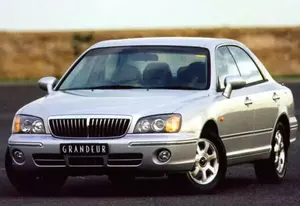
| Vehicle | Curb weight | Difference from world's smallest | Weight to power ratio | 0—60 mph acceleration ratio | Consumption ratio |
|---|---|---|---|---|---|
| 3.0i V6 |
1666 kg / 3674 lbs |
1241 kg (2737 lbs) heavier | 9 kg to 1 hp | - | - |
| 2.0i V6 |
1537 kg / 3389 lbs |
1112 kg (2452 lbs) heavier | 11 kg to 1 hp | - | - |
| 2.5i V6 |
1557 kg / 3433 lbs |
1132 kg (2496 lbs) heavier | 9 kg to 1 hp | - | - |
| Vehicle | 3.0i V6 |
|---|---|
| Curb weight |
1666 kg / 3674 lbs |
| Difference from world's smallest | 1241 kg (1241 lbs) heavier |
| Weight to power ratio | 9 kg to 1 hp |
| 0—60 mph acceleration ratio | - |
| Consumption ratio | - |
| Vehicle | 2.0i V6 |
| Curb weight |
1537 kg / 3389 lbs |
| Difference from world's smallest | 1112 kg (1112 lbs) heavier |
| Weight to power ratio | 11 kg to 1 hp |
| 0—60 mph acceleration ratio | - |
| Consumption ratio | - |
| Vehicle | 2.5i V6 |
| Curb weight |
1557 kg / 3433 lbs |
| Difference from world's smallest | 1132 kg (1132 lbs) heavier |
| Weight to power ratio | 9 kg to 1 hp |
| 0—60 mph acceleration ratio | - |
| Consumption ratio | - |

| Vehicle | Curb weight | Difference from world's smallest | Weight to power ratio | 0—60 mph acceleration ratio | Consumption ratio |
|---|---|---|---|---|---|
| 2.5i V6 |
1475 kg / 3252 lbs |
1050 kg (2315 lbs) heavier | 8 kg to 1 hp | - | - |
| 2.0i V6 |
1475 kg / 3252 lbs |
1050 kg (2315 lbs) heavier | 10 kg to 1 hp | - | - |
| 3.0i V6 |
1580 kg / 3484 lbs |
1155 kg (2547 lbs) heavier | 8 kg to 1 hp | - | - |
| Vehicle | 2.5i V6 |
|---|---|
| Curb weight |
1475 kg / 3252 lbs |
| Difference from world's smallest | 1050 kg (1050 lbs) heavier |
| Weight to power ratio | 8 kg to 1 hp |
| 0—60 mph acceleration ratio | - |
| Consumption ratio | - |
| Vehicle | 2.0i V6 |
| Curb weight |
1475 kg / 3252 lbs |
| Difference from world's smallest | 1050 kg (1050 lbs) heavier |
| Weight to power ratio | 10 kg to 1 hp |
| 0—60 mph acceleration ratio | - |
| Consumption ratio | - |
| Vehicle | 3.0i V6 |
| Curb weight |
1580 kg / 3484 lbs |
| Difference from world's smallest | 1155 kg (1155 lbs) heavier |
| Weight to power ratio | 8 kg to 1 hp |
| 0—60 mph acceleration ratio | - |
| Consumption ratio | - |
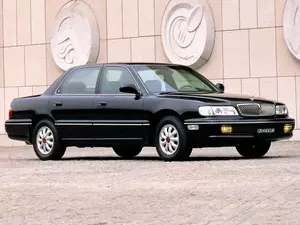
| Vehicle | Curb weight | Difference from world's smallest | Weight to power ratio | 0—60 mph acceleration ratio | Consumption ratio |
|---|---|---|---|---|---|
| 3.0i V6 |
1660 kg / 3660 lbs |
1235 kg (2723 lbs) heavier | 8 kg to 1 hp | - | - |
| 2.0i |
1540 kg / 3396 lbs |
1115 kg (2459 lbs) heavier | 11 kg to 1 hp | - | - |
| 2.5i V6 |
1645 kg / 3627 lbs |
1220 kg (2690 lbs) heavier | 10 kg to 1 hp | - | - |
| 3.5i V6 |
1760 kg / 3881 lbs |
1335 kg (2944 lbs) heavier | 8 kg to 1 hp | - | - |
| Vehicle | 3.0i V6 |
|---|---|
| Curb weight |
1660 kg / 3660 lbs |
| Difference from world's smallest | 1235 kg (1235 lbs) heavier |
| Weight to power ratio | 8 kg to 1 hp |
| 0—60 mph acceleration ratio | - |
| Consumption ratio | - |
| Vehicle | 2.0i |
| Curb weight |
1540 kg / 3396 lbs |
| Difference from world's smallest | 1115 kg (1115 lbs) heavier |
| Weight to power ratio | 11 kg to 1 hp |
| 0—60 mph acceleration ratio | - |
| Consumption ratio | - |
| Vehicle | 2.5i V6 |
| Curb weight |
1645 kg / 3627 lbs |
| Difference from world's smallest | 1220 kg (1220 lbs) heavier |
| Weight to power ratio | 10 kg to 1 hp |
| 0—60 mph acceleration ratio | - |
| Consumption ratio | - |
| Vehicle | 3.5i V6 |
| Curb weight |
1760 kg / 3881 lbs |
| Difference from world's smallest | 1335 kg (1335 lbs) heavier |
| Weight to power ratio | 8 kg to 1 hp |
| 0—60 mph acceleration ratio | - |
| Consumption ratio | - |
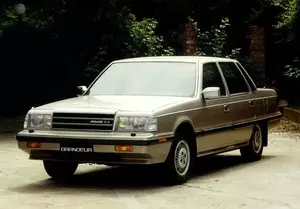
| Vehicle | Curb weight | Difference from world's smallest | Weight to power ratio | 0—60 mph acceleration ratio | Consumption ratio |
|---|---|---|---|---|---|
| 2.0i |
1390 kg / 3065 lbs |
965 kg (2128 lbs) heavier | 12 kg to 1 hp | 113 kg/s (249 lbs/s) |
126 kg/L (278 lbs/L) |
| 3.0i V6 |
1520 kg / 3352 lbs |
1095 kg (2415 lbs) heavier | 9 kg to 1 hp | 149 kg/s (329 lbs/s) |
124 kg/L (273 lbs/L) |
| 2.4i |
1420 kg / 3131 lbs |
995 kg (2194 lbs) heavier | 11 kg to 1 hp | 97 kg/s (214 lbs/s) |
129 kg/L (284 lbs/L) |
| Vehicle | 2.0i |
|---|---|
| Curb weight |
1390 kg / 3065 lbs |
| Difference from world's smallest | 965 kg (965 lbs) heavier |
| Weight to power ratio | 12 kg to 1 hp |
| 0—60 mph acceleration ratio | 113 kg/s (249 lbs/s) |
| Consumption ratio |
126 kg/L (278 lbs/L) |
| Vehicle | 3.0i V6 |
| Curb weight |
1520 kg / 3352 lbs |
| Difference from world's smallest | 1095 kg (1095 lbs) heavier |
| Weight to power ratio | 9 kg to 1 hp |
| 0—60 mph acceleration ratio | 149 kg/s (329 lbs/s) |
| Consumption ratio |
124 kg/L (273 lbs/L) |
| Vehicle | 2.4i |
| Curb weight |
1420 kg / 3131 lbs |
| Difference from world's smallest | 995 kg (995 lbs) heavier |
| Weight to power ratio | 11 kg to 1 hp |
| 0—60 mph acceleration ratio | 97 kg/s (214 lbs/s) |
| Consumption ratio |
129 kg/L (284 lbs/L) |